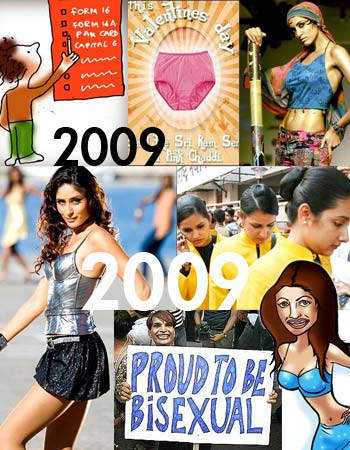
What do you see when you look back at the last of the 'noughties'? An outrageous campaign involving pink colour underwear, young folks losing their jobs, a landmark election that threatened to sway in various directions, legalisation of homosexuality -- the list can simply go on.
The year that started on a somewhat gloomy note thanks to the Lehman Brothers did have a mixed bag to offer as it went along. Dr Singh came back to power much to the relief of the investors and the girls proved they were better than the boys as three of them bagged the top spots at the IAS examinations. Finally there was the CAT fiasco that left a lot of aspirants fuming but on the other hand the younger ones had a reason to celebrate with Kapil Sibal announced that there wouldn't be any Class X exams.
Surely you couldn't have asked for more in one year. We take a look at some of the events that made us smile and some others that made us sit up and take a grim note of the world around us:

The tin pot Sri Ram Sene emerged out of nowhere and decided that it was 'against Indian culture' for women to frequent pubs to drink and dance. So activists from this right wing Hindu barged into a pub in Mangalore in January and thrashed the youth present there.
After much hullabaloo, the man who headed the Ram Sene Pramod Muthalik was briefly arrested and security outside pubs and nightspots was stepped up.
The act was severely criticised but the most significant reaction came from a bunch of women who decided to send pink panties (chaddi) to his office address somewhere in Hubli. At the last count, Muthalik had received over 1,500 pieces of underwear from across the country.
The cheeky campaign gained much momentum and received bouquets and brickbats but threatened to go astray as some enthusiastic senders started receiving threat calls.
Needless to say the dust has settled for now and we'll probably have to wait for just another month and half to see if the chaddis have had the desired effect or not.

It wasn't until Kareena Kapoor lost weight that the nation awoke to the concept of 'size zero'. The Bollywood star had lost kilos and kilos of weight for her role in Tashan where she sported a two-piece bikini.
Before anyone knew it, the craze caught on. Rujuta Diwekar, who trained Bebo, wrote Don't Lose Your Mind, Lose Your Weight, became an overnight celeb as the book sold over 10,000 copies in the first 20 days itself!
Tashan bombed and the craze slowly died out. Kareena Kapoor got her curves back and kept insisting that the look was only for the film.
Having the last laugh, we suspect, was Katrina Kaif who not only replaced Aishwarya Rai as the ambassador for a prominent jewellery brand but also retained her top spot at the movies with her curvy figure.
As a recent motorcar ad rightly puts it -- curves are back.
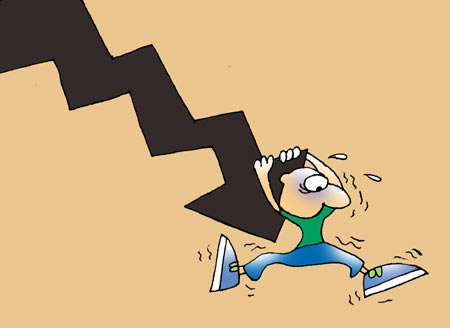
The year could well have been the most difficult one for HR professionals. For perhaps the first time in their careers almost the whole bunch of them was writing out severance packages. This barely a year after they were hiring the very same people. Worst hit were the investment bankers, IT professionals and young students who kept waiting for a call from the companies that had given them rosy offer letters before leaving them out in the cold. IIT and IIM grads too saw some rough patches but were lucky enough to get jobs.
As the year went by though cheer began to return to the country's economy (can they ever keep us down for long?) and jobs started trickling in slowly but surely. While most took up the offers that came their way, other enterprising people showed big corporations the finger and started out on their own.
Even though some HR folks are now looking at the market with some amount of scepticism, deep inside everyone believes that perhaps, just perhaps the worst is behind us now.
Illustration: Uttam Ghosh
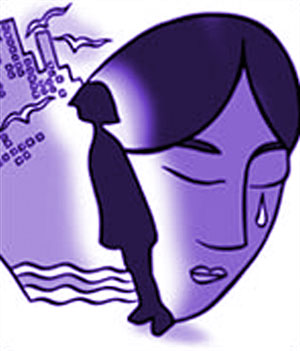
Four guys on roofies in a film set in Vegas might have made for a blockbuster. But when the infamous date rape drug came to India it shocked the entire nation.
A 23-year-old American girl studying at the Tata Institute of Social Sciences or TISS alleged that she was raped by six of her male friends after being drugged. As the men were put behind bars accusations began to fly fast as they claimed she was the one who provoked them. A nation-wide debate sparked, leaving a lot of women wondering whether to accept a drink from their friends, let alone from a total stranger.
Illustration: Dominic Xavier
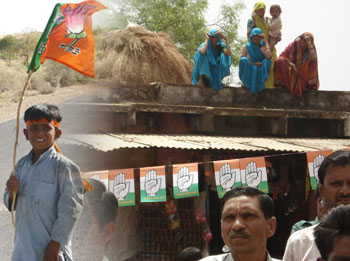
The 2009 general elections were unarguably one of the most defining moments of Indian politics. The nation watched with bated breath as the mild-mannered Manmohan Singh took on the aggressive LK Advani in an election that was to decide the course of the Indian economy.
Even as the two men battled it out, other contenders such as Mayawati looked like they'd play spoilsport.
Indeed, a lot was at stake. But most important of all were aspirations of a young India -- 50 per cent of the country's population is below 35 years of age -- that would have been defined by the outcome.
The young and restless realised the importance of stability for once. And a country that was recovering from terrorism and recession voted for stability and peace and chose Congress over the rest. The party won over 200 seats by itself, a feat that many thought would have been impossible.
Unsurprisingly serious cracks appeared among the ranks of the right-wing party BJP and the Leftists who had played spoilsports all through the last five years.
Dr Singh, who'd ushered in Liberalisation back in the '90s showed he still had it in him to pack a punch.
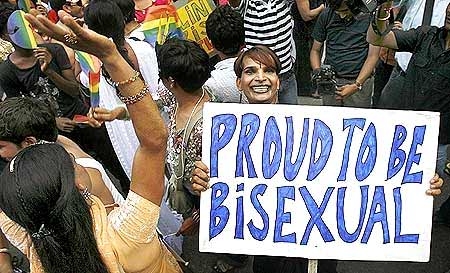
377 could well be the number that defined the year. The section under the Indian Penal Code criminalises sexual activity "against the order of nature." In July this year the High Court of Delhi decriminalised same-sex behaviour amongst consenting adults thereby leaglising homosexuality.
The verdict that came after eight years of struggle was hailed by many and criticised by some.
Yes, the matter has gone to the Supreme Court. Sure, the government is yet to take an official stand on the issue.
But for those who have been living in the closet, the ruling has indeed come as a breath of fresh air.
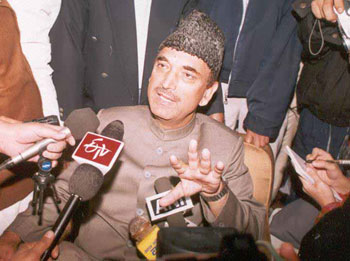
The national health minister, Ghulam Nabi Azad made news in July when he stressed that bringing electricity to rural India is in fact the answer to India's growing population.
Of course everyone could do with some lights and fans but what Azad was trying to get at was somewhat convoluted.
Electricity would bring in television sets and more late night television, according to him, would lead to less hanky-panky and effectively less children.
While the 60-year-old politician was much ridiculed, not just in India but also in the overseas press, we somehow cannot help but wonder if he'd heard of a somewhat less expensive solution to the problem called the condom.

In June, four women's colleges in Kanpur ordered a ban on girls wearing jeans, stating that the move would help reduce incidents of eve-teasing. Carrying mobile phones was also barred, while women teachers were told not to wear sleeveless blouses. Strong protests saw the Uttar Pradesh state government crack down on the all four institutions and the bans were promptly retracted.
But just when you thought all was well, another college dress code controversy cropped up just a month later -- on August 19, SVS College in Bantwal near Mangalore allegedly banned a young Muslim girl from attending lectures wearing a headscarf. And on August 29, youngsters and irate parents participated in an agitation outside Vani College in Hyderabad after the principal supposedly instructed students not to wear their burqas to class and ordered that the college gates be closed to prevent them entering.

They've always outshined the boys at various state board school and college examinations. But when three women secured the top three spots at the IAS examination this year, it was a record that made many sit up and notice.
Out of 3.18 lakh candidates, Shubhra Saxena, in her second attempt topped the exam. Sharandeep Kaur Brar came in second, while Kiran Kaushal took third place.
All three had attempted the IAS before but none had expected such great results. The topper has been an IIT grad and was planning to give the IAS one last shot before giving it up altogether. Sharandeep who came in second is the only child of a farmer in Punjab.
Indeed, it was a bastion that was waiting to be broken into. Success in this exam is supposed to dictate the dowry rate for an eligible bachelor. We're waiting to see if someone's willing to do the same for these three girls.
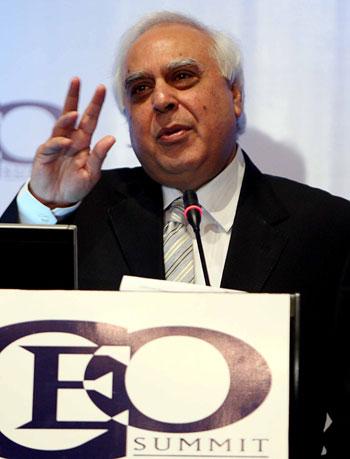
It was the stuff that students' dreams are made of -- no board examinations the end of a long 10-year torture! Could anyone have asked for any more?
We suspect there must have been a cry of collective joy when Kapil Sibal, the union education minister, announced a string of changes to the Class X scoring process of the CBSE board. This included giving students a choice to give the board examinations a pass altogether!
As it seemed some of us had popped the bubbly a little too early in the day. And as it sparked a national debate, it turned out that the move only applied to students who intended to continue in the same institutions (many CBSE schools have faculties till Class XII). So the festoons went right back into the shelves and out came the books again.
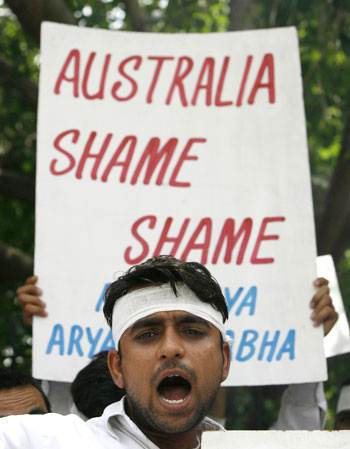
Just when the hardcore nationalists were beginning to smile about the 17-per cent drop in the number of Indian students going to the US, came the attacks on Indians in Australia.
The reputation of the continent-country, that has been a popular education destination for many Indian students, took a beating. Things began to get ugly even as discussion forums took up the cause and ministers made statements condemning the attacks.
On the flipside though the attacks did hold up a mirror to those who criticised migrant north Indian labourers making a living in Mumbai.
Meanwhile according to the QS/Times Higher Education rankings, more South East Asian universities made their presence felt in the top 100 educational institutions of the world.

After much speculation, discussions and debate, the CAT was finally out of the bag. Technical snags and irate aspirants marked the entrance examination to India's most prestigious institutions, the IIMs.
The exams that were so far being conducted with the good ol' pen and paper went online this year amidst much fanfare.
Some enterprising CAT trainers applied and appeared for the exams themselves to get a feel of what life would be like after the paper and pen were discarded.
Much to everyone's agony systems crashed, rumours of computer viruses and inefficiency started doing the rounds even as the aspirants fretted over cancelled examinations.
Some demanded a re-exam. Others were just happy with what they'd done. But certain questions -- what happens if there is a power failure or if a computer crashes -- remain. Then again whoever said it was easy to bell the CAT?
Illustration: Uttam Ghosh